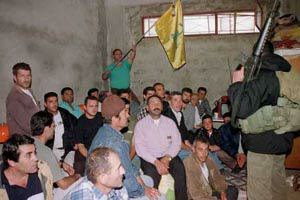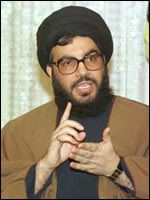 |
| Vol. 2 No. 6 | Table of Contents MEIB Main Page | 1 July 2000 |
 |
| A Hezbollah guerrilla guards former SLA militiamen in the village of al-Khiam on May 24 (AP Photo/Hussein Malla) |
In the aftermath of Israel's precipitous withdrawal from south Lebanon in May, an estimated 2,300 residents of the security zone have been taken into custody by Hezbollah guerrillas and Lebanese security forces. After several days of incommunicado detention, interrogation, and in some cases torture, at various camps under the control of Syrian and Lebanese military intelligence, most of the detainees are now being herded through Lebanon's Permanent Military Court (PMC) in a marathon series of ninety-second show trials that Amnesty International has called "travesties of justice,"1 while others have simply "disappeared."
Most of the detainees were initially held at a number of detention facilities in the Beirut area and the Syrian-controlled Beqaa Valley for a period of up to ten days for questioning by military intelligence officials, during which they were not permitted any contact with concerned relatives or legal counsel. Some of the detainees later reported being beaten during their detention and many said they were forced to lie on their stomachs with their hands cuffed behind their backs for up to 24 hours. After this initial period of incommunicado detention, they were taken to various prison facilities to await trial. The treatment there was hardly an improvement. Prisoners are kept in horrendous, overcrowded conditions--witnesses say that over 100 detainees have been squeezed into a single room. An elderly diabetic, 72-year old Georges Said, died on June 28 after prison officials took away his Israeli-made medication.2 A "well-informed" source at Roumieh Prison, where most of the prisoners are now being held, told the Foundation for Human and Humanitarian Right-Lebanon (FHHRL) that "many of the detainees had bruises when they were brought in."3
As it turns out, these were the lucky ones--many south Lebanon residents who were abducted by Hezbollah are still unaccounted for. According to al-Hayat, twenty people were seized in the village of Aitroun on June 7.4 Five were later released by Hezbollah, but the others are still missing. Despite repeated appeals for their release by human rights groups, Hezbollah officials have repeatedly claimed to have "no information on the subject."5
Lebanon's Permanent Military Court (PMC) began holding tri-weekly marathon court sessions (temporarily suspended after the death of Syrian President Hafez Assad) on June 5. The court, headed by Brigadier Maher Safieddine, has issued 605 verdicts, with most sentences ranging from fines to 15 years in prison. The longest sentence handed down so far was 120 years for Emile Yussef Nasr, who commanded a brigade of the South Lebanon Army (SLA) militia and was found guilty of 10 counts of "collaboration with the Israeli enemy in a position of responsibility."
The integrity of the proceedings has been severely compromised, even by Lebanese judicial standards. In the vast majority of the trials, which have lasted about 90 seconds on average, neither the accused nor their lawyers have made any attempt to present a formal defense. The detainees have generally offered only a heavily-rehearsed plea for mercy. Even in the handful of trials in which a defense of sorts has been offered (lasting up to five minutes or so), the lawyers have not called any witnesses or presented any evidence to contest the charges, relying only on the generic argument that intimidation by Israel and economic deprivation led the accused to collaborate.
According to one of the lawyers present at the hearings, about half of the detainees were visibly limping when they arrived in court.6 Only a few have explicitly testified that they were tortured, however. "I was beaten up and heard frightening cries which forced me to confess that I fed the (SLA) security network," Hussein Zayn al Abidin told the court. Another said he had been "suspended" in the air for refusing to answer a question.7 The judges have ignored such allegations, declining to either order medical examinations or call witnesses that might substantiate the claims. Nor have the defense lawyers attempted to follow up on these allegations. In fact, it appears that they have been counseling their clients not to make such statements.
The Beirut Bar Association, which assigned defense lawyers for the hearings, has said that these "travesties of justice" are largely due to several steps taken by the Lebanese government in order to severely impair the ability of defense attorneys to mount a proper defense of their clients. The lawyers are not given access to relevant documentation until a few hours before the trial and are not permitted to meet privately with their clients (in most cases, they have never even seen their clients prior to walking into the courtroom). Most attorneys, while well-intentioned, see no purpose served in mounting a serious defense because the judges are under intense pressure from above to speed things along. Calling witnesses or presenting evidence is unlikely to sway their rulings, the argument goes, and risks provoking them into handing down a harsher sentence.
 |
| Hassan Nasrallah |
The atmosphere surrounding the trials has been heavily charged by Hezbollah incitement clearly intended to affect the court proceedings. Just prior to their commencement, Hezbollah Secretary-General Hassan Nasrallah condemned the lawyers who had volunteered to defend the detainees. "It's shameful to find in Lebanon people willing to defend them," he said, speaking before a crowd of tens of thousands of people on June 2.8 Not surprisingly, all of the Shi'ite defense lawyers quickly withdrew. In the same speech, Nasrallah said that "all SLA members . . . are collaborators in the crimes that occurred and they should get the punishment they deserve." He emphasized repeatedly that none should be released under any circumstances. "Let the government send them abroad or put them in a rehabilitation center," he said, "but don't allow them to go back to their homes."9 A few days later, two detainees who had been released by the court for health reasons--Muhammad Ayoub Fares, 52, and Muhammad Said Hassan Bassam, 78--were hospitalized after being severely beaten by an angry crowd of demonstrators.10 Hezbollah politburo chief Muhammad Raad reacted by publicly warning the court not to free any more of the "collaborators" because "they will be only tracked down and assaulted by their neighbors."11
Christian Lebanese religious and political groups have protested vehemently about the human rights abuses and flimsy trial proceedings. The Council of Catholic Patriarchs, headed by Maronite Cardinal Nasrallah Sfeir, announced on June 30 that it is forming a committee "to ensure that the trials are fair and nondiscriminatory and that treatment of the prisoners is respectful of human rights." The National Liberal Party, headed by Dory Chamoun, issued a statement which strongly denounced "the poor treatment of the arrested people, contrary to human rights."12 No response from Lebanese officials has been forthcoming.
Although many in Lebanon have repeatedly implored the government to deploy the army to protect the residents of south Lebanon, Syria has refused to give it the green light to do so, for this might create the impression that Lebanon has taken steps toward normalization with Israel. So for the indefinite future, there will be no security for residents of the south.
1 Amnesty International Press Release, 21 June 2000.
2 Al-Nahar (Beirut), 29 June 2000.
3 Foundation for Human and Humanitarian Right-Lebanon (FHHRL) Press Release, 6 June 2000.
4 Al-Hayat (London), 9 June 2000.
5 The Daily Star (Beirut), 26 June 2000.
6 FHHRL Press Release, 16 June 2000. The report cites the estimate of a lawyer present in the courtroom.
7 FHHRL Press Release, 26 June 2000.
8 The Daily Star (Beirut), 3 June 2000.
9 Ibid.
10 L'Orient-Le Jour (Beirut) 6 June 2000.
11 Al-Nahar (Beirut), 8 June 2000.
12 AFP, 20 June 2000.